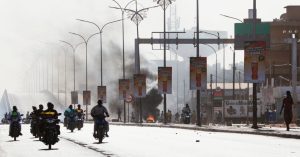
Umm Muhammed Umar
A senior researcher and a West Africa specialist, Professor Jasper Bjarnesen, and Professor Emiratis Andre Thomashausen, discussed Burkina Faso’s latest coup attempt with Radio Islam.
Professor Thomashausen said that we are witnessing the replay of a script that has resulted in the United Nations Secretary General, António Guterres referring to it as ‘an avalanche of coups’. Prof Bjarnesen said that this was the failure of democracy, and not the failure of the state – the failure of the of the copycat systems imposed in the early 1990’s on African countries to try and repeat British-style, western-style democracy. He said, “So, it leads to hunger. Like here in South Africa, half the adult population doesn’t know what they will be able to eat tomorrow, and that leads to huge dissatisfaction.” He added that it also led to totally incompetent and corrupt leadership: “in this case, the military had gone on two weeks without food because the government needed to pay for the expensive cars and the tailor-made suits.” When the pivot point was reached, Lt. Col. Paul Damiba, who had already executed a coup once before, in 2015 (which brought to power President Roch Marc Christian Kaboré to power), took the reins to find a better way to manage Burkina Faso.
Professor Bjarnesen commented that Kaboré has always feared that certain factions within the army might conducted coup. He said that in recent months, Kabore had been reassigning posts within the military leadership. He said, “So, part of the reason for the coup happening now may be that certain offices were not pleased with that restructuring that the President was undertaking.”
According to Professor Thomashausen no one knew where the President was being kept. Both ECOWAS and the AU, were helplessly requesting that the new leadership in Burkina Faso not harm Kaboré and his people. Further, Thomashausen said that his political career was over. He described Kabore as, “the son of a wealthy post-colonial family. His father was a governor of the National Bank. He is a typical product of French education.” He added, “he basically appears, and conducts himself, as somebody who’s more French than the French.” Kabore apparently, has very little grounding in the in the country, the fate of people and Burkina Faso.
Regarding reports suggesting different factions within the army, with each faction demanding something different from the other, Professor Bjarnesen explained soldiers had been protesting at several different military camps throughout the country during the weekend leading up to the coup. These were soldiers who were just claiming basic support from the government. They wanted their salaries paid, better equipment, and greater assurance that their families would be taken care of, should they be killed in battle. They were soldiers closer to the to the frontlines of the fighting that Burkina Faso was currently facing. Meanwhile, within the military leadership, there were generals with close ties to the political elite, and so less inclined to upset the status quo. Then, there were mid ranking officers who have been less impressed by the leadership of the President. Bjarnesen said, “and I think that the coup maker, Damiba, is one of those.” He added, “So I don’t think you will see sort of factions from within the army competing over power now, but there are definitely sort of divisions within the armed forces, and that was a challenge for the now previous president, and it will be a challenge for the current junta as well.”
Professor Thomashausen said there has been a lot of popular support for the coup in Burkina Faso, as had been for the coup in Sudan, the earlier coup in Guinea, and the coup in Mali. All these indicated the coming to an end of the governance systems in Africa that have failed. He said, “Africa needs to try and improve its governance and its leadership selection methods, even here in South Africa.” Thomashausen said that there was complete insensitivity when half the population was going hungry, while the leadership continued collecting Rolls Royces and Bentleys, and wining and dining in super luxury restaurants.” On a sinister note, he warned, “The trouble is coming.”







0 Comments